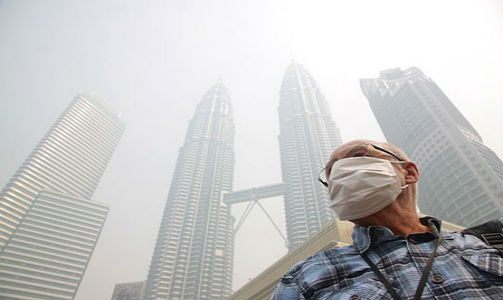Statement by Darrel Webber, Secretary General of RSPO, on the Environmental Pollution in South East Asia

Roundtable on Sustainable Palm Oil (RSPO), June 25, 2013
The environmental pollution caused by forest fires in Indonesia that has enveloped several countries in South East Asia to such hazardous levels is deplorable. The RSPO firmly condemns any negligent activities related to this. The RSPO is highly concerned about the impact on communities and children living in these countries and strongly advocates urgent measures to be taken to cease this heightening pollution.
To all those individuals, companies and groups that have provided information and reached out to the RSPO to look into this matter – Thank You. We assure you that as an international multi-stakeholder organization and certification scheme for sustainable palm oil, the RSPO's Principles & Criteria explicitly indicate that no open burning is permissible.
Within its capacity, the RSPO is critically looking into this to first of all identify the member organizations that have been indicated as implicated; secondly to instruct them to immediately deploy measures that will terminate any open burning that may have been caused by them; and thirdly; RSPO will take remedial actions against these companies if the forest fires is due to negligent conduct.
Of the numerous companies reported to be involved in the forest fires in Indonesia through the various media and online platforms, the RSPO confirms that five of these are member companies. These companies are:
1. PT Jatim Jaya Perkasa;
2. Tabung Haji Plantations;
3. Sinar Mas;
4. Kuala Lumpur Kepong;
5. Sime Darby;
By virtue of being a RSPO member it is a must that these companies have a policy across all their operations that strictly prohibit open burning and have standard operating procedures to manage fire risks as per the requirement of the RSPO’s Principles & Criteria.
The RSPO will be directing these member companies to submit digital maps of their plantations in Sumatra and Kalimantan within the next 48 hours; which will be used to assess and analyze against the published mapping of the forest fires by NASA (National Aeronautics and Space Administration) and NOAA (The National Oceanic and Atmospheric Administration). The analysis will assist in confirming the locations of the forest fires in comparion with the location of plantations owned by these member companies; which will then form the basis for the next step in the investigation.
The next step will focus on validating the reason behind the forest fires on whether this is due to negligent conduct or otherwise. If the investigations confirm negligent conduct, the RSPO will not hesitate to take action. However, the RSPO recommends avoiding speculation at this stage allowing investigations to determine whether these RSPO member companies are involved.
It is apparent, based on independent reporting done by the World Resources Institute, that there are several sources to the current fires: 47% of the fires in Indonesia originate outside of forest or oil palm plantations; 27% originate in timber plantations; 20% in oil palm plantations; 4% on protected areas; 1% in logging areas.
http://insights.wri.org/news/2013/06/peering-through-haze-what-data-can-tell-us-about-fires-indonesia
While the RSPO is a platform for recourse towards its member companies and will do whatever it takes to play its part in reducing the hazardous pollution - it is highly crucial that this is a collective effort as its member companies make up a diminutive portion in the overall scale of the issue - other regulatory enforcements must immediately and urgently step in.
The satellite imagery on the forest fires clearly delineate that it is highly prevalent within peatlands. Peat systems cover large areas and each system may include multiple landowners and land use. Fires that begin within peatlands do not necessarily manifest in the same location as it is often indicated that they spread along great distances underground, invisible to the eye before the fire actually appears. This makes it much more important to ensure that the effective management of peat is implemented at a landscape level rather than on a management unit level. Hence, authorities should ensure effective landscape level management protocols are in place prior to allowing any development on peat.
Statements provided by RSPO member companies:
Tan Sri Dato' Mohd Bakke Salleh
Sime Darby President and Group Chief Executive
"Sime Darby Berhad fully supports the initiative by RSPO. I would like to reiterate Sime Darby's commitment and full compliance of the zero burning policy, which is strictly embedded in all our oil palm plantation operations."
Sin Chuan Eng
Kuala Lumpur Kepong Head of Sustainability
"We will be making arrangements to submit the digital maps of our plantations to RSPO and shall give the RSPO fullest cooperation during the process of the proposed investigations."
Back